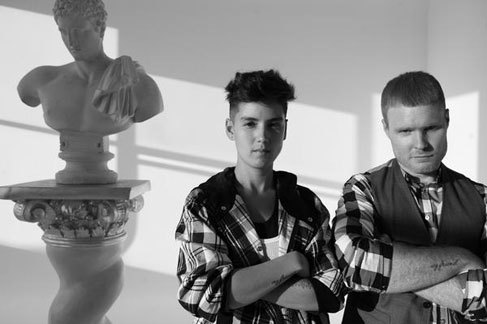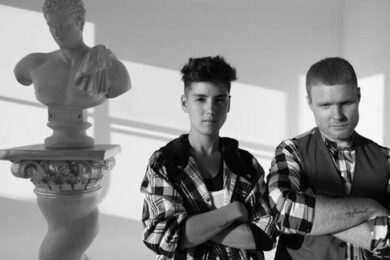"Disco will never be over. It will always live in our minds and hearts. Something like this, that was this big, and this important, and this great, will never die. Oh, for a few years – maybe many years – it’ll be considered passé and ridiculous. It will be misrepresented and caricatured and sneered at, or – worse – completely ignored. People will laugh about John Travolta, Olivia Newton-John, white polyester suits and platform shoes and people going like this [strikes disco pose]. But we had nothing to do with those things and still loved disco. Those who didn’t understand will never understand: disco was much more, and much better, than all that. Disco was too great, and too much fun, to be gone forever! It’s got to come back someday. I just hope it will be in our own lifetimes."
This speech from actor Matt Keeslar, a jarringly inspirational moment in Whit Stillman’s otherwise disastrously dull Last Days Of Disco (killer soundtrack album notwithstanding), might be coming true at last. It’s been a long wait.
Old battle scars don’t heal easily, and few music wars have been as bloody or as enduringly divisive as that between rock and disco. The notorious Comiskey Park incident in which radio jocks Garry Meier and Steve Dahl – whipping up thinly-veiled homophobic and racist sentiment – organised a public blowing-up of disco records in a Chicago baseball stadium, was merely the most famous flashpoint of the ‘Disco Sucks’ campaign of 1979. (And, of course, was inadvertently a powerful endorsement for the disco movement: as the old proverb goes, "By their enemies shall ye know them".)
"By their enemies shall ye know them" – a modern news report on the Comiskey Park incident
Three decades later, the signs are that the stigma attached to disco has finally ebbed away. Two excellent mix albums have pointed the way back to the source: Ellboy, the latest (and finest) from International Deejay Gigolos prime mover DJ Hell, and Bob Sinclar Live At The Playboy Mansion (the French have always had a special relationship with disco, ever since Sheila & B Devotion’s ‘Spacer’ provided one of the genre’s greatest moments).
Meanwhile, in New York City, disco’s spiritual home, the metaphorical mirrorballs are spinning once again. The rise of the Scissor Sisters from underground art-fag rumour to global pop phenomenon did a lot to shake up inhibitions and loosen uptight arses. In their wake come, among others, Hercules & Love Affair (with Antony Hegarty essentially doing for them what Alison Moyet did for Vince Clarke in Yazoo), and their similarly-named city-mates Heloise & The Savoir Faire (imagine Frankie Goes To Hollywood fronted by a young Stevie Nicks).
And, back in the UK, some of the sharper thinkers in the indie sector are ahead of the curve. With their Erol Alkan-produced second album Couples, The Long Blondes have amplified their already-latent disco tendencies to stunning effect, while Franz Ferdinand (surely already pretty disco themselves) toyed with the idea of having their third album produced by Brian Higgins’ Xenomania, the team responsible for Girls Aloud’s finest moments, among others.
During the disco era itself, some of the most enthusiastic wearers of ‘Disco Sucks’ badges were the doltish and reactionary wing of the punks. The truth is that disco and punk – both brilliantly populist, and brilliantly pop responses to the hippy hegemony – were never natural enemies, as Debbie Harry, one of the few punks to understand the potential of disco, recognised on ‘Heart Of Glass’ and ‘Atomic’. It’s surely no coincidence that she turns up as guest vocalist three times on Heloise & The Savoir Faire’s debut album.
One thing that Allan Jones and Jussi Kantonen’s excellent disco history Saturday Night Forever makes abundantly clear is that disco’s importance was social as much as musical. If disco had only consisted of the exclusive, elitist Byzantine decadence of Studio 54 (which by all accounts, including Anthony Haden-Guest’s eyebrow-raising The Last Party, amounted to Caligula with a four-to-the-floor backbeat) it would still have been a fascinating curio which left some exhilarating music behind. But it was far more than that: disco was nothing less than a cultural revolution.
Rockers in the 50s had their hops, and the mods in the 60s had their underground sweatboxes, but for most people in smalltown Britain and America prior to disco, the phrase ‘night club’ meant somewhere self-consciously faux-classy where you sported your special-occasion eveningwear, drank overpriced white wine, ate chicken in a basket and made stilted attempts at seduction to the sounds of light jazz and lounge music. Disco changed everything. For the first time, straight white people, taking their cue from the black, latino and gay subcultures, were partying in significant numbers. The spirit, borrowed by Chic ("these are the good times") from Roxy Music ("the good life isn’t won by degrees"), was at the same time democratic and openly aspirational: the high life, on a Saturday night at least, is for everyone.
One of the prime rockist critiques of disco was that it somehow wasn’t ‘real’ music. Indeed, given that replicating many of the best disco records onstage would require balancing the sound of a Moog sequencer with a 24-piece string section, ‘cutting it live’ was impractical. Some bands, the extraordinary Chic for example (see Daryl Easlea’s Everybody Dance: Chic And The Politics Of Disco for a full account of their importance), could cut it live and, as you’ll be aware if you’ve been fortunate enough to catch Nile Rodgers’ touring band, still can. But "cutting it live" is a hippy quality-gauge (you can almost feel the ghost of Whispering Bob Harris looking over your shoulder), which completely misses the point of music which was created specifically for the radio and the dancefloor.
Chic play ‘Le Freak’ live in 1978
With the passage of time, disco has become viewed by the more enlightened critics – Garry Mulholland’s polemic This Is Uncool: The 500 Greatest Singles Since Punk And Disco being a superb example – as a Year Zero on a par with that of punk. At the time, however, the post-punkers’ response to disco was a belated and qualified one. Whether it was ACR and PiL in the UK, or Tom Tom Club and ESG in the States, it invariably involved engaging with funk rather than disco per se (funk bearing roughly the same relationship to disco that rock does to pop: its more earnest, more serious, more highbrow older brother). All very well, but nothing to make you wanna do spins or lose yourself in the dizziness of the moment. Only Duran Duran fessed up to fantasising about fusing the Sex Pistols with Chic, and who ever took them seriously?
A decade later, the Madchester craze may have lured white rock demographic back onto the dancefloor in significant numbers, but the indie-dance crossover was all about connecting with techno (which, like funk, also carried a certain chin-strokey respectability). For twenty years, the word ‘disco’ was inseparable from wacky stag nights and student rag weeks, and the comedy trappings of afro wigs, white waistcoats and flares " essentially everything predicted by the speaker in Stillman’s film.
The mood started to change in the mid-90s, and it took the French, unencumbered by the weight of rockist gravitas, to make it happen. The likes of Daft Punk, Cassius, Etienne de Crecy and countless lesser-known disco-house pioneers began to turn dancefloors back into somewhere you could actually throw some moves, not just monkey-dance or nod your head.
Goldfrapp acknowledged the French connection in 2005, making a respectful nod towards Cerrone’s apocalyptic, millenarian 1977 epic ‘Supernature’, naming their third album after it, and playing it directly before stage-time for a whole tour.
By 2008, the slow-crashing wave has rippled back to New York, London, Berlin and beyond, and Hell, Hercules and Heloise, Bob and the Blondes, Franz Ferdinand and many others are, in their individual ways, proving that it’s possible to exhibit a love of disco without having anything whatsoever to do with "John Travolta, Olivia Newton-John, white polyester suits and platform shoes and people going like this".
Getting taken seriously while doing it is another matter. But life’s too short to worry about that.
Disco makes it to the British regions



